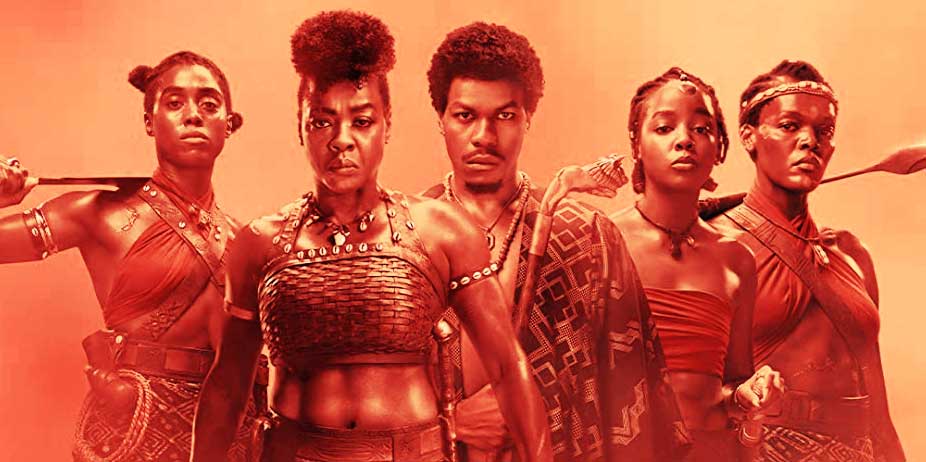
The Woman King (2022)
This film is a compelling historical drama about a female group of warriors known as the Agojie. It opens in the early 1800s, and the slave trade is rapidly increasing the wealth of the Kingdom of Dahomey, despite the contempt its general, Nanisca (Viola Davis) has for the practice. She hopes to inspire King Ghezo (John Boyega) to turn his attention to producing olive oil instead, but the Portuguese pay more for human flesh. A recent raid has deprived them of some of their townspeople, so Nanisca leads her warriors on a rescue that brings them to the attention of a rival army, who takes over their port and demands the Dahomey sacrifice goods and people to stay in business.
While Nanisca navigates a political crisis, a batch of new girls comes to train to become Agojie, including the fierce Nawi (Thuso Mbedu). Nawi’s parents tried to sell her to a husband, but after he slapped her across the face for being insolent, she shoved him to the ground. In a rage, her adopted father leaves her at the palace steps as a “present for the king.” Nawi loves the grueling training for the Agojie, but is reckless and impatient to excel. She wants more than anything to win Nanisca’s approval, and become “the best” warrior. And soon, she will get her chance to test her mettle on the battlefield…
Even though there has been some controversy about this story erasing the true history of the Dahomey tribe, it’s a compelling story with an almost all-female cast, about a time period few other films have ever addressed. It’s beautifully acted, wonderfully written, and gives us a bunch of interesting, emotionally-engaging characters. It builds our fondness toward them in such a way that when they eventually go to war, we’re on the edge of our seats, hoping none of them get killed. Nawi is a powerful heroine, but Nanisca carries most of the narrative as a war-hardened female general who has had to “earn” everything she has achieved, including her battle scars. She has a horrific past that haunts her (a gang rape) and even though I don’t like rape as the common “female trope,” it works well here because it’s woven into the story in a meaningful way.
The film allows the female warriors to be fierce, and hold their own, but also is realistic in that they can’t magically beat men twice their size; they get thrown around, slapped around, and a few of them even die. They know that if they are captured, the men will “use” them, and are ready to slit their own throats than suffer gang-rapes. It’s fascinating to see them interact, share stories, and become a sisterhood, and there’s even a little bit of romance (though it’s forbidden). In truth, the Dahomey was a brutal war tribe who made human sacrifices, and who grew wealthy off the slave trade by raiding other villages and selling the captured men and women to the Portuguese. They had no qualms about selling those they captured (or about slitting their throats on Holy Days) and continued in the trade into the early 1900s. Here, the main characters have modern morals, and disapprove of the trade. I don’t mind this, because it’s no different than white filmmakers erasing the sins of their ancestors to make them seem less awful in a modern context, but viewers should be aware that the story is a revisionist take on history, and some Black audiences have denounced it as inaccurate.
As a story, it’s a good one, full of memorable characters with strong motivations; it’s hard not to cheer for these women, shed tears over their losses, and feel proud of their triumphs and the powerful sense of family between them. As Izogie (Lashana Lynch) tells Nawi, when she hears her sob story about her difficult childhood says, “The Agojie are your family now.”
Sexual Content:
The women wear midriff-bearing outfits. A woman sees an almost-naked man (as do
we) with his hands covering his privates after she steals his pants. A flashback
to a rape (we see a close-up of the man on top of her, and see her arms
shackled); the same woman says she was raped many times over many days by many
different men.
Language:
None, other than one use of "bitches."
Violence:
Lots of in-combat violent deaths; men and women are beaten to a pulp, punched,
stabbed, kicked, shot, etc. Some blood. Necks snap, swords slash, spears thrust.
Some of it is against women by men, much of it is against men by women.
Other:
They give sacrifices at pagan altars. A woman throws nuts and stones and reads what they tell her, predicting a dream.
